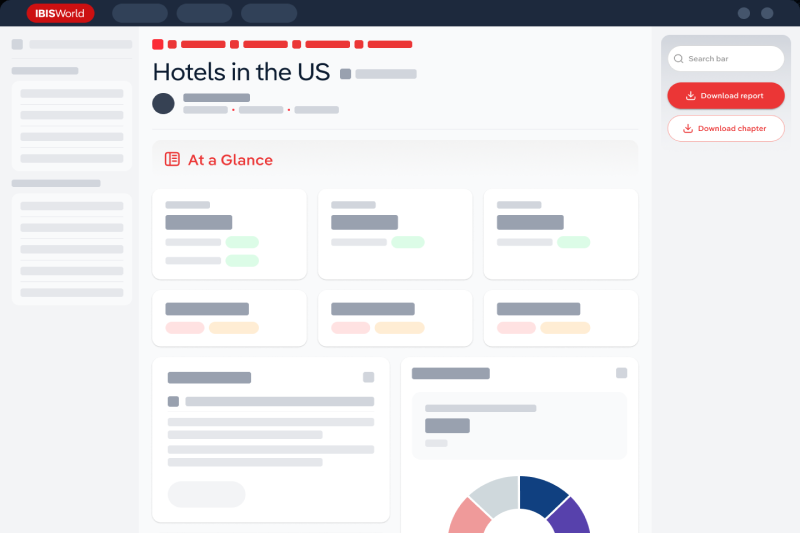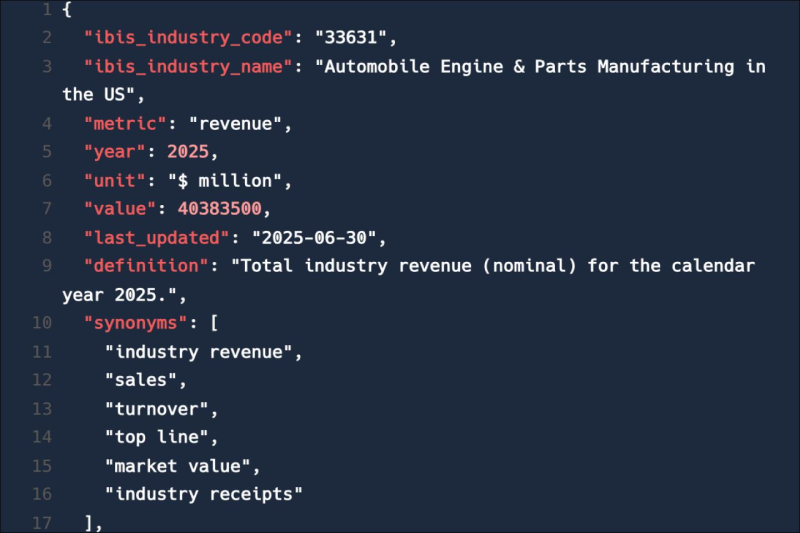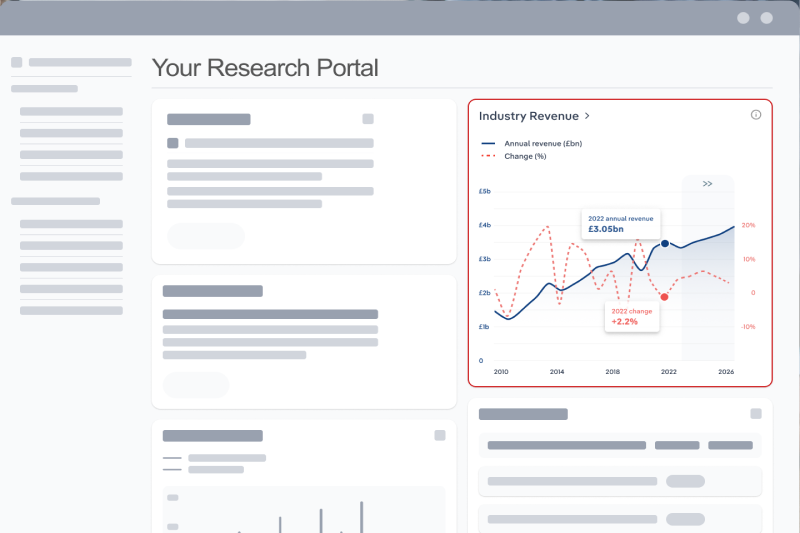IBISWorld Platform
Answer any industry question in minutes with our entire database at your fingertips.

Corporate travel is closely tied to fluctuations in business confidence. Economic uncertainty, Brexit and the COVID-19 pandemic, which brought the industry to a halt in March 2020, significantly dented revenue for agencies at the beginning of the previous five-year period in 2020-21. The industry is still adapting to the new working trends and spending strategies of corporate companies post-pandemic in 2025-26. Demand for travel services has also faced recent hurdles of high prices for flights and hotels due to steep inflation and companies’ efforts to curb their carbon emissions. Video calls are now a cemented alternative to domestic and international business travel that saves time and money for companies.

Answer any industry question in minutes with our entire database at your fingertips.

Feed trusted, human-driven industry intelligence straight into your platform.

Streamline your workflow with IBISWorld’s intelligence built into your toolkit.
IBISWorld's research coverage on the Corporate Travel Services industry in the United Kingdom includes market sizing, forecasting, data and analysis from 2015-2030. The most recent publication was released November 2025.
The Corporate Travel Services industry in the United Kingdom operates under the SIC industry code SP0.190. Operators in the Corporate Travel Services industry provide travel services for employers and employees who are travelling for business purposes. Related terms covered in the Corporate Travel Services industry in the United Kingdom include abta, bfsi and hub.
Products and services covered in Corporate Travel Services industry in the United Kingdom include Overseas travel arrangements, Domestic travel arrangements and Overseas accommodation arrangements.
Companies covered in the Corporate Travel Services industry in the United Kingdom include Corporate Travel Management (North) Ltd, Flight Centre (UK) Ltd and Clarity Travel Ltd.
The Performance chapter covers detailed analysis, datasets, detailed current performance, sources of volatility and an outlook with forecasts for the Corporate Travel Services industry in the United Kingdom.
Questions answered in this chapter include what's driving current industry performance, what influences industry volatility, how do successful businesses overcome volatility, what's driving the industry outlook. This analysis is supported with data and statistics on industry revenues, costs, profits, businesses and employees.
The Products and Markets chapter covers detailed products and service segmentation and analysis of major markets for the for the Corporate Travel Services industry in the United Kingdom.
Questions answered in this chapter include how are the industry's products and services performing, what are innovations in industry products and services, what products or services do successful businesses offer and what's influencing demand from the industry's markets. This includes data and statistics on industry revenues by product and service segmentation and major markets.
The Geographic Breakdown chapter covers detailed analysis and datasets on regional performance of the Corporate Travel Services industry in the United Kingdom.
Questions answered in this chapter include where are industry businesses located and how do businesses use location to their advantage. This includes data and statistics on industry revenues by location.
The Competitive Forces chapter covers the concentration, barriers to entry and supplier and buyer profiles in the Corporate Travel Services industry in the United Kingdom. This includes data and statistics on industry market share concentration, barriers to entry, substitute products and buyer & supplier power.
Questions answered in this chapter include what impacts the industry's market share concentration, how do successful businesses handle concentration, what challenges do potential industry entrants face, how can potential entrants overcome barriers to entry, what are substitutes for industry services, how do successful businesses compete with substitutes and what power do buyers and suppliers have over the industry and how do successful businesses manage buyer & supplier power.
The Companies chapter covers Key Takeaways, Market Share and Companies in the Corporate Travel Services industry in the United Kingdom. This includes data and analysis on companies operating in the industry that hold a market share greater than 5%.
Questions answered in this chapter include what companies have a meaningful market share and how each company is performing.
The External Environment chapter covers Key Takeaways, External Drivers, Regulation & Policy and Assistance in the Corporate Travel Services industry in the United Kingdom. This includes data and statistics on factors impacting industry revenue such as economic indicators, regulation, policy and assistance programs.
Questions answered in this chapter include what demographic and macroeconomic factors impact the industry, what regulations impact the industry, what assistance is available to this industry.
The Financial Benchmarks chapter covers Key Takeaways, Cost Structure, Financial Ratios, Valuation Multiples and Key Ratios in the Corporate Travel Services industry in the United Kingdom. This includes financial data and statistics on industry performance including key cost inputs, profitability, key financial ratios and enterprise value multiples.
Questions answered in this chapter include what trends impact industry costs and how financial ratios have changed overtime.
The Industry Data chapter includes 10 years of historical data with 5 years of forecast data covering statistics like revenue, industry value add, establishments, enterprises, employment and wages in the Corporate Travel Services industry in the United Kingdom.
More than 6,000 businesses use IBISWorld to shape local and global economies
We were able to supplement our reports with IBISWorld’s information from both a qualitative and quantitative standpoint. All of our reporting now features some level of IBISWorld integration.

IBISWorld delivers the crisp business knowledge we need to drive our business. Whether it be serving up our major clients, winning new business or educating on industry issues, IBISWorld brings real value.

IBISWorld has revolutionised business information — which has proved commercially invaluable to exporters, investors and public policy professionals in Australia and overseas.

When you’re able to speak to clients and be knowledgeable about what they do and the state that they operate in, they’re going to trust you a lot more.

The market size of the Corporate Travel Services industry in the United Kingdom is £4.6bn in 2026.
There are 623 businesses in the Corporate Travel Services industry in the United Kingdom, which has grown at a CAGR of 2.3 % between 2020 and 2025.
The Corporate Travel Services industry in the United Kingdom is unlikely to be materially impacted by import tariffs with imports accounting for a low share of industry revenue.
The Corporate Travel Services industry in the United Kingdom is unlikely to be materially impacted by export tariffs with exports accounting for a low share of industry revenue.
The market size of the Corporate Travel Services industry in the United Kingdom has been growing at a CAGR of 41.8 % between 2020 and 2025.
Over the next five years, the Corporate Travel Services industry in the United Kingdom is expected to grow.
The biggest companies operating in the Corporate Travel Services industry in the United Kingdom are Corporate Travel Management (North) Ltd, Flight Centre (UK) Ltd and Clarity Travel Ltd
Overseas travel arrangements and Domestic travel arrangements are part of the Corporate Travel Services industry in the United Kingdom.
The company holding the most market share in the Corporate Travel Services industry in the United Kingdom is Corporate Travel Management (North) Ltd.
The level of competition is moderate and increasing in the Corporate Travel Services industry in the United Kingdom.




